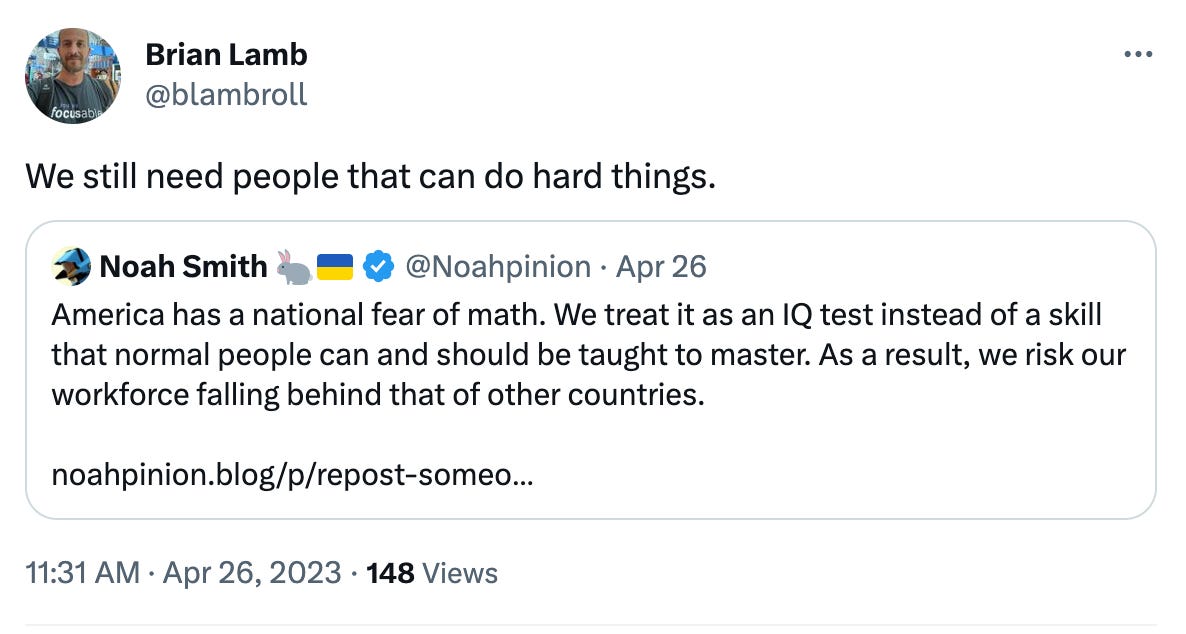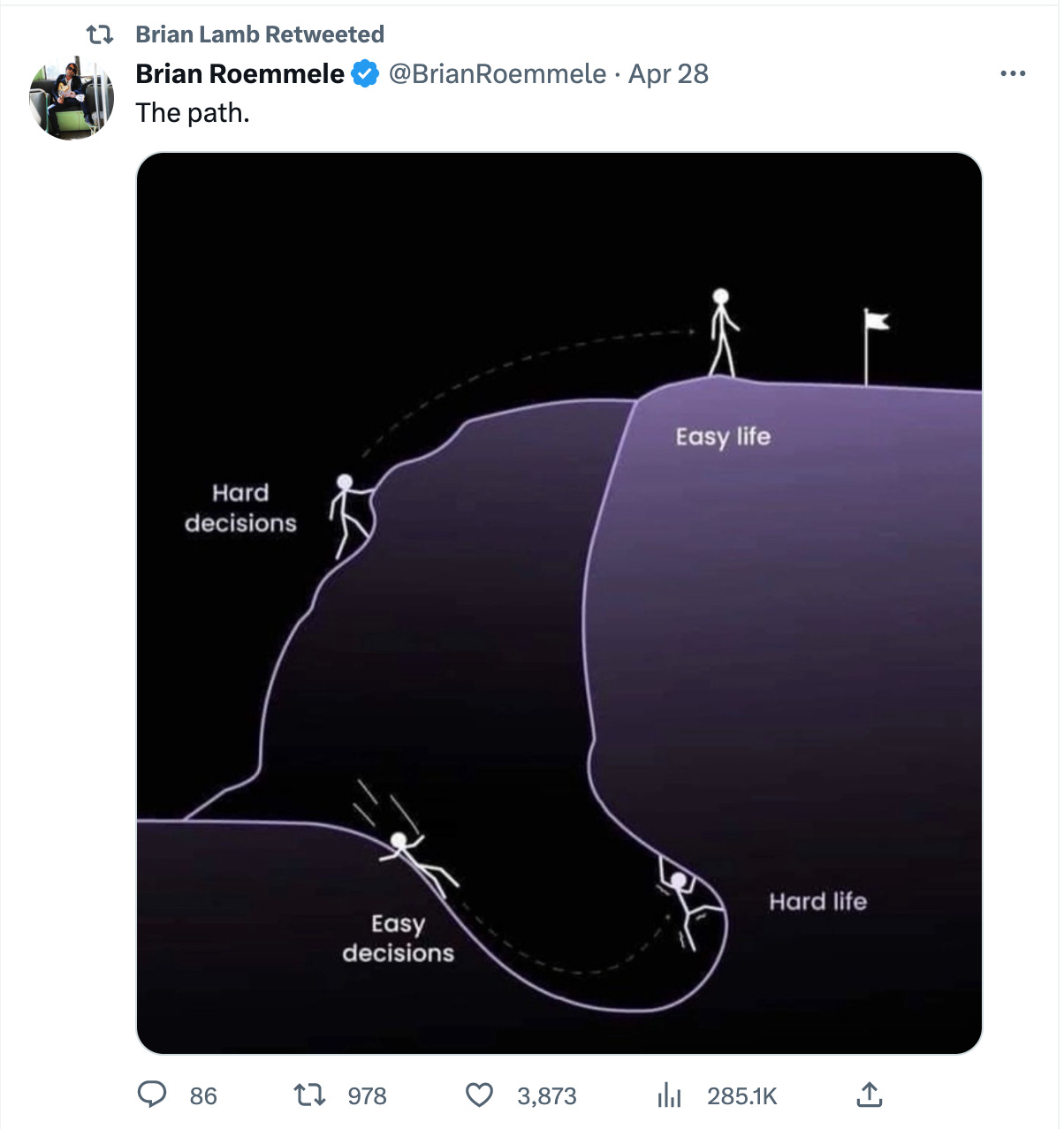Handing Over Greatness
I was just playing guitar for about an hour after not playing for 8 months. I’ve been visiting my parents’ house, and without my own instruments. I finally went upstairs to find the guitar we gave my dad for father’s day years ago that he never plays - an Epiphone EJ160E - driven to learn a song or two that have been on my mind lately. I so rarely play guitar in this house that if I do, it’s not hard to think about having first picked up the instrument in this very spot more than 25 years ago. Every time I play seriously for a bit, I can’t help thinking about how my guitar teacher, Larry, would always get annoyed with me. I had a very high level of physical skill at the age of 14, but I often would not practice each week until the day of my lesson. It may come as no surprise that I never excelled as a musician or performer.
I certainly wasn’t being forced into learning an instrument - so why did I never get great? I still think about this when I experience a moment like the one described above.
Struggle can take many forms, and our brains naturally want to avoid it. That’s why we become so prone to distraction; it’s not because we really want to watch 10 videos about cats (at least not most of us). It’s because we really want to find another way to deal with the uncomfortable truth that we have to be willing to put in effort in order to receive the relative benefits of doing something difficult. Joy, meaning, and happiness are not just sitting there for you to grab. They are earned and discovered in layers - like facing struggle itself.
“I wanted the result and not the process. I was in love not with the fight but only the victory. And life doesn't work that way.” ― Mark Manson
I continued taking lessons with the same teacher well into college, still leaning on whatever bit of natural talent I had and perfecting things that to many people would seem quite technically difficult. I played together with my teacher at a couple of small live events that were his attempt at giving me a sense of what I could be doing if I lent my full attention. I was terrible at it. I had no coordination between my left and right hands (I still don’t, really). I found it near impossible to find rhythm with my right hand and never made it through lessons where we would work on it. It was not fun.
What I think I’ve learned since then is this: I did not have the attentional skill to resist the temptation of easier, smoother pathways. It wasn’t enough to just tell me to practice. I had to be excited to accept the challenging path before me - something that feels endless when you’ve not done it before.
It sounds insane, but I never learned that you had to be willing to do very hard things in order to achieve very good things - things worthwhile, meaningful, and even valuable. It’s not enough to have an interest - even an intense one! You would have had a hard time finding a kid more passionate about stuff than I was. But my attention was on soaking up information rather than doing anything with it. I did not know how to sacrifice other, more short-term pleasures in order to find any kind of success. So I never became great, and I was always frustrated. Obviously, so was Larry.
In the situation I’m describing in this newsletter, my only real adversary was myself. Sure, I had all the normal distractions of entertainment and the invention of Oregon Trail that any 14-year-old had in 1996. But most of the time, my mind was left alone. Mostly, I decided what I did.
In 2023, our attention is fought over as the ultimate prize. Way beyond the power of social media, the latest developments in AI promise that they can help us achieve goals even faster, do things that we didn’t think were possible - and with very little resistance. Will we be unmotivated to tackle the real challenges we need to face - to struggle through - in order to be successful? What about our own goals and ideas? It’s reasonable to think this un-motivation to push through struggle would eventually make us increasingly less able to do so as a result. Like anything worth doing, struggle takes practice. If you struggle well, you can likely do anything. Maybe that’s what’s meant when people say “if you just put your mind to it…” Where they are really talking about is the strength and persistence it takes to be great - at anything.
I can’t help but think: how would I have handled having generative AI at my disposal at 14? Maybe I would have been someone who, wanting to achieve the next level, winds up using it to indulge in fantasies, consequently not being exposed to the risks that would have made me better. Perhaps the need to feel safe in my success would take over. Why risk the error? The disappointment? I’m not sure where that would stop, or to what end. Would that make me great? Just writing this, it doesn’t feel like those ‘achievements’ would hold any personal gain. So what exactly would “great” mean in this situation?
I’ve come to learn that when it comes to personal growth, so much of this comes down to where you focus your attention, and how good you are at bringing it back to center when it goes astray. Isn’t that the definition of overcoming struggle? Doing something exceptionally difficult because you want to achieve something exceptionally rewarding? Only then can we move to the next level.
If I really think about it, my problem with not working up to my potential as a guitarist comes down to the process. I was willing to do what I was good at, but not willing to work at what would bring me to the next level and beyond. This is what would have made me great.
In order to ensure that we are not relinquishing our greatness as humans, we have to make sure we don’t do away with every instance that pushes against our attentional resistance.
The Optima List
The best possible list of opportunities
🎧 We Now Have a Podcast!
In case you haven’t noticed, two weeks ago we launched our new podcast - The Optimalist, of course. If you are already a subscriber to this newsletter, you will receive new episodes in your inbox every Wednesday, but they are also available everywhere you listen to podcasts. We want to encourage commenting and sharing - and thanks to everyone who has been an early supporter! We can’t wait for the robust conversations this new journey will bring us. Check out the trailer below:
🧠 Focusable Version 14 is Now Available
Focusable’s latest release this week brings one of the most-quested features in our short history: intentions. Now you can set an intention or pick a goal for your focus session. This helps you focus on one thing at a time. No multitasting! Focusable is the pulse of energy you need for better attention.
Also Included:
Now, the Pulse timer is the center of your experience. Use the Pulse timer to Refocus and then swipe to recharge or record when you need.
Set your intention for each activity you start
Label your activities to understand where you spend your focus time
Resume existing activities
Improved activity cards
Check out the video here for a more detailed description, and create your own free account by downloading Focusable on iOS or Android devices, or by going here.
💪 Use Focusable to Conquer Hard Things
Just like the narrative at the beginning of this newsletter suggests, we are making sure to not turn away from the tasks, projects, and activities that we believe will take us to the next level. We are now blogging about this consistently, and compiling them here. Check out how we’re using Focusable to…
and pay better attention as a parent - among other things.
New examples are added daily. And we’d love to know: what hard things do you feel like you’re resisting? Let us know in the comments, and maybe you’ll inspire our next piece.
💪 Calmer, More Focused Testing
Regardless of your beliefs about testing, we can agree that testing season is stressful for everyone. And that stress impacts performance and affects everyone’s energy. It was brought to our attention by Focusable user Andrea Trudeau that maybe this year we can play a role in helping this test season be a calmer, more focused one. And guess what? Learning how to focus our attention in this way helps with our capacity to do hard things - even when it’s not our favorite activity. Click here to read our recommendations.
📣 NEW: Bi-monthly Product Tours
Now you have two opportunities each month to join the Focusable Team for a product walkthrough. Learn how you can build routines for better attention using the 3-step structure of Focusable – Recharge, Refocus, Record. And meet other educators who are looking to connect and share ideas!
🗣️ Join Our Virtual Community Space
We are exploring the intersection of mindfulness and focus as the way to create the optimal future for education - especially as the age of AI has arrived. We invite you to join our growing group of educators interested in:
discussions about mindfulness and focus, and their importance now and in the future of edu
sharing how they use Focusable, as well as feedback & requests
direct support from the product team and community
contributing to a community / collaborating with others
early access to new features, plus a space to grow personally and professionally






